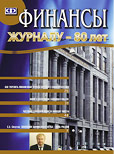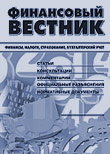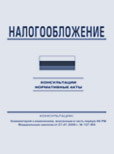Содержание
Финансы и бюджет: проблемы и решения
Интервью с
В.Я. Порембским, министром финансов Калининградской области
E-mail: barbakadze@minfin39.ru
Об успехах финансовой политики, проводимой в Калининградской области, самом западном субъекте РФ. А также о проблемах региона, ставшего в 90-е годы эксклавом, и пережившем в связи с этим более глубокий социально-экономический спад, чем другие регионы России.
Ключевые слова: свободная экономическая зона, льготный таможенный режим, диверсификация экономики, программа эффективности бюджетных расходов, дотации на выравнивание бюджетной обеспеченности.
М.Ю. Алашкевич, заместитель директора Департамента бюджетной политики в отраслях социальной сферы и науки Минфина России
E-mail: Mikhail.Alashkevich@minfin.ru
Концепция реформы государственных и муниципальных учреждений предусматривает, что финансовое обеспечение их деятельности теперь должно быть непосредственно связано с конкретными результатами оказания государственных и муниципальных услуг, вместе с тем расчет нормативных затрат на оказание этих услуг так и не стал повседневной практикой. Финансирование учреждений сохранено на прежнем уровне, а показатели государственных заданий зачастую установлены формально. В таких условиях учреждения не мотивированы конкурировать за получение больших объемов государственных заданий или оказание услуг более высокого качества. Финансирование, по сути, по-прежнему оторвано от результата.
В статье описываются основные направления решения задач, возникающих в связи с необходимостью увеличения эффективности использования бюджетных ресурсов и недопустимостью наращивания бюджетных расходов на оказание госуслуг.
Ключевые слова: государственные (муниципальные) услуги, отраслевой (базовый перечень государственных услуг, ведомственный перечень государственных услуг.
М.А. Абдулхалыков, министр финансов Волгоградской области
E-mail: post@volgafin.ru
Об объединении Минфином Волгоградской области различных уровней бюджета на одной централизованной информационно-технической платформе для дальнейшей интеграции с федеральной системой «Электронный бюджет».
Ключевые слова: «Электронный бюджет», региональный бюджет, муниципальный бюджет, Компания «Бюджетные и финансовые технологии».
К 20-летию федерального казначейства
Н.А. Разманова, профессор кафедры «Экономическая история и история экономических учений» Финансового университета при правительстве РФ, доктор исторических наук
E-mail: ran5813@rambler.ru
С полным правом к плеяде реформаторов финансовой системы России можно отнести директора департамента государственного казначейства Я.А. Купреянова, под чьим прямым руководством была проведена реформа кассы. Эта реформа обязательно упоминается, когда речь идет о деятельности государственной казначейской службы в 1860–1870-х гг., но то, как реформа осуществлялась, кто руководил этой работой, до сих пор в научной литературе не описано. Документы Российского государственного исторического архива (РГИА), Государственного архива Костромской области (ГАКО), а также нормативные акты, опубликованные в Полном собрании законов Российской империи (ПСЗ) легли в основу настоящей работы, имеющей цель представить первый опыт биографии Я.А. Купреянова, показать его роль в введении в России системы единства кассы.
Ключевые слова: антикризисное управление, реформа кассы, сокращение штатов, единство кассы.
Казначейство: становление и развитие
А.И. Лукашов, заместитель руководителя УФК по Владимирской области, кандидат экономических наук, доцент
E-mail: ailuka@vladofk.elcom.ru
Повышать качество кассового обслуживания бюджетов субъектов Российской Федерации и муниципальных образований необходимо на постоянной основе, используя различные инструменты. В настоящей статье отражена лишь часть из них. По мнению автора, самый эффективный инструмент – общение с клиентом: на совещаниях, «круглых» столах, по телефону, через официальный сайт и т.д.
Ключевые слова: поэтапный мониторинг, порядок обработки платежных поручений.
Актуальное интервью
E-mail: finance-journal@mail.ru
В Мумбаи (Индия) в октябре т.г. прошел 35-й Всемирный алмазный конгресс. Ключевые участники алмазной индустрии, а также главы министерств из разных стран, связанных с алмазной промышленностью, обсуждали пути решения проблем, стоящих перед отраслью, и направления ее развития.
В ходе конгресса состоялись выборы Президента Международной ассоциации производителей бриллиантов (IDMA). Впервые в истории главой этой важнейшей отраслевой организации был избран представитель России – генеральный директор ОАО «ПО «Кристалл», Председатель Совета Ассоциации российских производителей бриллиантов
Максим Александрович Шкадов.
Вернувшись с конгресса, М.А. Шкадов в своем интервью журналу «Финансы» рассказал о результатах международного форума и положении России в отрасли.
Ключевые слова: алмазодобыча, производители бриллиантов, алмазопереработка.
Налоги: теория и практика
В.А. Кашин, профессор РЭУ им. Г.В. Плеханова, доктор экономических наук
Н.В. Пономарева, доцент РЭУ им. Г.В. Плеханова, кандидат экономических наук
E-mail: kashin5033108@mail.ru
Авторы предлагают ряд мер по повышению эффективности налогового контроля, исходя из передового опыта ряда зарубежных стран. В России, по их мнению, само целеполагание в этой сфере построено на ложных предпосылках. В США ведется осмысленная борьба с легализацией преступных доходов, а в РФ во главу угла ставятся искоренение «однодневок» и недопущение «обналички».
Ключевые слова: налоговый контроль, объекты налогообложения, проверка доходов госслужащих.
Страхование
Т.Н. Черногузова, доцент кафедры финансов и кредита Калининградского государственного технического университета, кандидат экономических наук
E-mail: tanya_55@inbox.ru
В статье показана связь профессионального страхового образования с качеством страховых услуг. Обосновано, что квалификация персонала страховой компании влияет на ее конкурентоспособность. Анализируется зарубежный опыт страхового образования, его особенность и отличие от российского опыта. Предложены меры, направленные на повышение профессионального уровня российских страховщиков как необходимой составляющей конкурентоспособности страховых компаний.
Ключевые слова: страховая конкуренция, качество страховых услуг, страховое образование, зарубежный опыт страхового образования, условие конкурентоспособности страховых компаний.
А.С. Миллерман, генеральный директор САО «ГЕФЕСТ», доктор экономических наук
E-mail: lsy40@mail.ru
В статье изложены концепция, методы и практический опыт страхования крупных объектов. Показана необходимость гармонизации норм страхования и технического регулирования в проблеме обеспечения безопасности объектов на всех стадиях жизненного цикла. Обоснована целесообразность организации страхового сопровождения многолетнего строительства на основе взаимодействия подрядных и страховых компаний.
Ключевые слова: страхование, безопасность, техническое регулирование, мониторинг.
Е.Ш. Качалова, доктор экономических наук, профессор кафедры «Менеджмента в сфере услуг» РГТЭУ,
Н.В. Стрельников, аспирант кафедры мировой экономики факультета ФЭП МГЛУ
E-mail: nikorai@hotmail.co.jp
В статье исследуются современные способы страхования кредитных рисков (главным образом, риска дефолта облигаций) с применением свопов кредитного дефолта. Рассмотрен механизм действия кредитных свопов, определены параметры расчета их стоимости. Проанализирован ряд эффективных методов математического моделирования риска свопа. Предложен метод расчета стоимости на основе показателя рискового спреда, величина которого зависит от вероятности дефолта и коэффициента убыточности облигации. Практическое применение данного метода показано на примере крупнейшей американской страховой компании AIG.
Ключевые слова: своп кредитного дефолта, математическое моделирование, оценка риска, риск-менеджмент, страховой капитал.
Вопросы теории финансов
А.С. Колесов, главный научный сотрудник Центра бюджетного мониторинга Петрозаводского государственного университета, кандидат экономических наук
E-mail: akolesov@psu.karelia.ru
В настоящее время отсутствуют как официальные методики оценки эффективности финансовой политики определения, так и опубликованные рекомендации по её осуществлению. Хотя некоторые показатели (удельный вес монополий в создании ВВП, темпы инфляции, уровень собираемости налогов, доля застрахованного имущества всех собственников, рост капитализации фондового рынка и других) могут косвенно говорить о результативности проводимой финансовой политики. Однако проблема разработки методологии и методики оценки результативности проводимой финансовой политики остаётся. В статье рассматриваются подходы к решению этой проблемы.
Ключевые слова: финансовая политика, методология и методика определения величины индексов финансового положения, а также эффекта и эффективности финансовой политики.
Финансовые рынки
К.Л. Астапов, начальник отдела методологии регулирования управления регулирования и контроля над коллективными инвестициями ФСФР России, доктор экономических наук, член-корреспондент РАЕН
E-mail: ast_k@mail.ru
Производные финансовые инструменты, или деривативы, являются инструментами, предназначенными для передачи рисков одной стороной другой. Одна сторона контракта продает риск, а другая покупает. В принципе владение любым активом, которому присуща некоторая волатильность, означает, что собственник одновременно с самим активом приобретает и риски изменения стоимости актива. Однако в случае с деривативами ситуация иная. Актив не переходит в собственность к новому владельцу, но дериватив позволяет приобрести или продать риск, связанный с изменением стоимости актива или наступления иных обстоятельств. Фактически дериватив, выполняя функцию финансового рычага без вложения средств в актив (или осуществляя его короткую продажу), дает право на будущее приобретение (продажу) актива. В статье рассматриваются особенности развития рынка производных финансовых инструментов.
Ключевые слова: деривативы, опционный договор, производные финансовые инструменты, репо, репозитарий, своп-договоры, фьючерсные и форвардные контракты.
Б.М. Ческидов, доктор экономических наук, действительный член Академии военных наук
E-mail: elena@khovansky.ru
В статье рассмотрены макроэкономические причины текущего экономического кризиса и предложены теоретические модели, объясняющие особенности его развития и взаимодействия в кризисных условиях национальных экономик, в первую очередь с точки зрения состояния их финансовых рынков. Анализируется способность отдельных государств и межгосударственных объединений к перекладыванию кризисных явлений на своих партнеров, а также их способность к привлечению капитала как ресурса.
Ключевые слова: мировой кризис, «слабые экономики», конкуренция в финансовом секторе, ценные бумаги.
М.А. Котляров, профессор ГУУ, доктор экономических наук
E-mail: kotlyar2005@list.ru
Автор выступает за более высокое качество стратегического планирования и системный подход к регулированию финансовых рынков в РФ, предметно разбирает преимущества и недостатки передачи функций мегарегулятора Центробанку России, в целом поддерживая эту идею, но останавливаясь на сопутствующих рисках и возможном конфликте интересов.
Ключевые слова: мегарегулятор, консолидированный надзор, пруденциальные нормы.
Финансы социальной сферы
Пенсионная реформа: вопросы и ответы
На вопросы читателей отвечают специалисты Пенсионного фонда РФ.
Социология и статистика
В новом разделе журнала будут публиковаться результаты опросов населения, предоставленные Центром стратегических исследований компании РОСГОССТРАХ, и комментарии к этим данным руководителя Центра
А.Н. Зубца.
E-mail: alexei_zoubets@rgs.ru
Научные исследования аспирантов и соискателей
М.О. Медведева, аспирант кафедры «Управление социальными и экологическими системами», Российская академия народного хозяйства и государственной службы при Президенте РФ
E-mail: medvedevamo@gmail.com
В статье исследуется проблема информационной асимметрии, характерная для трансформационного этапа перехода к информационной экономике и не учитываемая классической экономической теорией. Автором дает определение термину «информационная асимметрия» и анализирует состояние современной экономики, в частности причины финансово-экономического кризиса 2007-2009 гг. с помощью данной концепции. Рекомендуется уделять особое внимание разработке концепции минимизации влияния асимметрии как на уровне микроуправления, на уровне рыночных взаимодействий субъектов экономики, так и на уровне макроуправления, на уровне оптимизации экономической системы в целом.
Ключевые слова: информационная экономика, информационная асимметрия, финансово-экономический кризис 2007-2009 гг.
Информация
Идеи, решения, рецепты предлагались на Российско-швейцарском деловом форуме.
Читателям и подписчикам журнала предложен обзор итогов состоявшейся 12.10.2012 г. в Москве международной конференции «Формирование в России благоприятного инвестиционного климата». Главными организаторами выступили Международная академия экономики, финансов и права (IAEFL) – партнер Совета Европы, Российский союз промышленников и предпринимателей, Финансовый университет при Правительстве РФ, швейцарская компания “Fetscherin – consult”.
На Форуме происходящее в стране в мире оценивалось «с точки зрения бизнеса». Докладчики не скрывали обеспокоенности по поводу того, что на балансах банков по-прежнему накапливаются триллионные долги.
Деньги при этом все равно аккумулируются в сырьевом секторе, а зависимость от нефтяных цен остается сильнейшей. Совсем не радовало участников то обстоятельство, что «государство довлеет над экономикой, вытесняя частный сектор». Причем не только в России, но и в странах Евросоюза, где, как было сказано, наблюдается «беспрецедентное огосударствление банковского сектора».
Стагнация или рецессия в главных экономиках мира болезненно отзываются на российской экономике. При этом высказывался тот тезис, что слабая интегрированность России в мировое хозяйство делает ее положение менее устойчивым, а не наоборот. Особое внимание было уделено страховой отрасли, которой еще только «предстоит стать крупным поставщиком инвестиционных ресурсов» и «занять надлежащее место в экономике». Не только у регуляторов, но и у инвесторов (в том числе в российский страховой бизнес) есть открытые вопросы к качеству активов и уставных капиталов страховых организаций.
Annotation
Interview with V.Ya. Porembskiy, Minister of Finance of the Kaliningrad region
E-mail: barbakadze@minfin39.ru
About the successes of financial policy conducted in the Kaliningrad region, the most western region of the Russia Federation. As well as about the problems of the region which became the exclave in 90th years and because of it survived over the deeper social and economic recession than other regions of Russia.
Keywords: free economic zone, preferential customs regime, economic diversification, program of efficiency of budget expenses, subsidies on equalization of fiscal means.
M.Y. Alashkevich, deputy director of Department of budgetary policy in the sectors of social sphere and science of the Ministry of Finance of Russia
E-mail: Mikhail.Alashkevich@minfin.ru
Concept of the reform of state and municipal establishments provides that the financial support of their activities should now be directly connected with concrete results of the provision of state and municipal services, calculation of the normative costs for provision of these services didn’t become an everyday practice. Financing of the establishment maintained at the same level and the indicators of the state tasks are often established formally. In such conditions establishments are not motivated to compete for receiving of large amounts of the state tasks or provision of services of higher quality. In fact financing is still cut off from the result.
Article describes the main ways of solving of problems arising in connection with the necessity of increasing of the efficiency of use of budgetary resources and inadmissibility of increasing of budgetary expenditures on provision of public services.
Keywords: state (municipal) services, industry (basic) list of state services, departmental list of state services.
M.A. Abdulhalikov, Minister of Finance of the Volgograd region
E-mail: post@volgafin.ru
About the unification of the different levels of budget by the Ministry of Finance of the Volgograd region into one centralized information and technical platform for further integration with the federal system “Electronic budget”.
Keywords: "E-Budget", regional budget, municipal budget, Company "Budgetary and financial technologies".
N.A. Razmanova, professor of chair “Economic history and history of economic teaching” of the Financial University under the Government of the Russian Federation, doctor of historical sciences
E-mail: ran5813@rambler.ru
With the full right Director of department of the Federal Treasury Ya.A. Kupreyanov is a member of pleiad of reformers of the financial system of Russia under whose direct supervision was carried out cash reform. This reform is necessarily mentioned when it comes to activities of the State Treasury service in 1860-1870's, but the way the reform was carried out, who supervised this work, still is not described in the scientific literature. Documents of the Russian State Historical Archive (RSHA), State Archive of the Kostromskoi region (SAKR) as well as normative acts published in the Complete collection of the laws of the Russian Empire (CCL) formed the basis of this work which has a purpose to show the first experience of biography of Ya.A. Kupreyanov and his role in the introduction in Russia of the system of unity of cash.
Keywords: anti-crisis management, cash reform, reduction of the staff, unity of cash.
A.I. Lukashov, deputy head of the Administration of Federal Treasury across the Vladimir region, candidate of economic sciences, associate professor
E-mail: ailuka@vladofk.elcom.ru
It is necessary to improve quality of the cash services of budgets of subjects of the Russian Federation and municipalities on the permanent base using variety tools. This article reflects part of them. According to the authors opinion the most effective tool is communication with client: at the meetings, “round” tables, by phone, via the official website and etc.
Keywords: step-by-step monitoring, procedure of processing of payment orders.
E-mail: finance-journal@mail.ru
35th World Diamond Congress passed in Mumbai (India) in October of this year. Key participants of the diamond industry as well as heads of ministries from different countries connected with diamond industry discussed the ways of solution of the problems which face the industry and directions of its development.
During the congress took place the elections of the President of the International Diamond Manufacturers Association (IDMA). For the first time in the history representative of Russia was elected as head of this important industry organization – General Director of Public Corporation “PO Kristall”, Chairman of the Board of the Association of Russian diamond manufacturers – Maxim Alexandrovich Shkadov. Returning from the Congress M.A. Shkadov in his interview to the “Finance” journal told about the results of international forum and the position of Russia in the industry.
Keywords: diamond extraction, manufacturers of diamonds, diamonds processing.
V.A. Kashin, professor of the Russian Economic University of the name of G.V. Plekhanov, doctor of economic sciences
N.V. Ponomareva, associate professor of the Russian Economic University of the name of G.V. Plekhanov, candidate of economic sciences
E-mail: kashin5033108@mail.ru
Authors propose a number of measures to improve the efficiency of tax control on the basis of experience of foreign countries. According to the authors opinion in Russia the goal setting in this sphere is based on false preconditions. There is meaningful fight against criminal money laundering in the U.S. and in the Russia Federation attention is given to eradication of “one – day companies” and non – admission of “cashing”
Keywords: tax control, objects of taxation, check of the incomes of the civil servants.
T.N. Chernoguzova, associate professor of chair of Finance and credit of the Kaliningrad State Technical University, candidate of economic sciences
E-mail: tanya_55@inbox.ru
Article shows the connection of professional insurance education with quality of insurance services. It is proved that qualification of the personnel of insurance company influences on its competitiveness. Article analyzes foreign experience of insurance education, its feature and difference from the Russian experience. The measurers directed on increasing of the professional level of the Russian insurers as a necessary component of competitiveness of insurance companies are offered.
Keywords: insurance competition, quality of insurance services, insurance education, foreign experience of insurance education, condition of competitiveness of insurance companies.
A.S. Millerman, general director of SAO “GEFEST”, doctor of economic sciences
E-mail: lsy40@mail.ru
Article describes concepts, methods and practical experience of insurance of the large objects. The necessity of harmonization of standards of insurance and technical regulation in the problem of ensuring the security of the objects at all stages of the lifecycle is shown.
Reasonability of organization of insurance support of the many-years construction on the basis of interaction of contract and insurance companies is substantiated.
Keywords: insurance, safety, technical regulation, monitoring.
E.Sh. Kachalova, doctor of economic sciences, professor, Faculty of Services Management of the Russian State University of Trade and Economics
N.V. Strelnikov, post – graduate student of chair of World Economy of Law and Economics Faculty of the Moscow State Linguistic University
E-mail: nikorai@hotmail.co.jp
The article examines modern credit risk insurance techniques (mainly – bond default risk) with the use of credit default swaps. The authors examine the operation mechanism of credit swaps and specify the parameters of its cost calculation, analyze a number of effective methods of mathematical modeling of the swap risk. Article offers methods of calculation of cost on the basis of indicator of the risk spread the amount of which depends on the default probability and bonds loss ratio. In support of its practical use, the authors provide application of this method on the example of AIG Inc., major US insurer.
Keywords: credit default swaps, mathematical modeling, risk assessment, risk management, insurance capital.
A.S. Kolesov, chief research officer of the Center of budget monitoring of the Petrozavodsk State University, candidate of economic sciences.
E-mail: akolesov@psu.karelia.ru
At the present time there are no official definitions of methodology of assessment of the efficiency of financial policy and published recommendations of its implementation. Although some indicators (specific weight of monopolies in the creation of GDP, inflation rate, level of collection of taxes, share of insured property of all owners, growth of capitalization of the stock market and others) may indirectly tell about the effectiveness of the ongoing financial policy. However there is still problem of development of the methodology and methods of the assessment of the effectiveness of the ongoing financial policy. Article considers the approaches to solution of this problem.
Keywords: financial policy, methodology and methods of definition of the value of the indices of financial condition and the effect and effectiveness of the financial policy.
K.L. Astapov, head of department of Methodology of regulation of Administration of regulation and control over the collective investments of FSFR of Russia, doctor of economic sciences, corresponding member of Russian Academy of Natural Sciences.
E-mail: ast_k@mail.ru
Derivative financial instruments or derivatives are the instruments meant for transfer of risks of one party to another. One party of contract sells risk and another buys it. In principle ownership of any asset, which has some volatility, means that the owner at the same time gains the asset and the risks of changes of the value of asset. However in case of derivatives, situation is different. Asset is not transferred to the ownership of the new owner, but derivative allows you to purchase or sell the risk connected with the changes of value of the asset or occurrence of the other circumstances. In fact, derivative fulfilling the function of financial leverage without investing in the asset (or implementing its short sale) gives the right to the future purchasing (selling) of the asset. Article considers the features of development of the market of derivative financial instruments.
Keywords: derivatives, option contract, derivative financial instruments, repo, repository, swap agreements, futures and forward contracts.
B.M. Cheskidov, doctor of economic sciences, member of the Academy of Military Sciences.
E-mail: elena@khovansky.ru
In given article the macroeconomic reasons of the current economic crisis are considered and the theoretical models explaining the features of its development and interaction in crisis conditions of national economies are offered, first of all from the point of view of a condition of their financial markets. Ability of the separate states and interstate associations to rearrange the crisis phenomena on the partners and also their abilities to attract the capital as a resource are analyzed.
Keywords: global crisis, "weak economy", competition in the financial sector, securities.
M.A Kotlyarov, professor of the State University of Management, doctor of economic sciences
E-mail: kotlyar2005@list.ru
Author argues for a higher quality of strategic planning and systematic approach to the regulation of financial markets in the Russian Federation, in detail examines the advantages and disadvantages of transfer of functions of mega regulator to the Central Bank of Russia, in whole supporting the idea, but dwelling on the related risks and potential conflict of interest.
Keywords: mega regulator, consolidated supervision, prudential norms.
Questions of readers are answered by the specialists of the Pension Fund of the Russian Federation.
M.O. Medvedeva, graduate student of chair «Social and environmental systems management», the Russian Academy of National Economy and Public Administration under the President of the Russian Federation
E-mail: medvedevamo@gmail.com
The article investigates the information asymmetry problem, which is related to the transformation stage of the transition to the information economy and which is not taken into account by the classical economic theory. The author examines the general concept of information asymmetry as well as analyzes the current state of the economy in particular causes of the financial and economic crisis of 2007-2009 in terms of this concept. In conclusion it is recommended to pay special attention to the concept of minimizing the impact of asymmetry at both the micro-level of management that is the level of market interactions of economic agents and the macro-level of management that is the level of optimization the whole economic system.br>
Keywords: information economy, information asymmetry, financial and economic crisis of 2007-2009.
Ideas, solutions and formulas proposed by participants of the Russian-Swiss Business Forum.
Dr Eduard Grebenshchikov presents a detailed review of results and conclusions of international conference “Formation of congenial investment climate in Russia”, which took place 12.10.2012 in Moscow. The forum was initiated by International Academy of Economics, Finance and Law (IAEFL) – the partner of Council of Europe, Russian Union of Industrialists and Entrepreneurs, Financial University under The Government of The Russian Federation and Swiss company Fetscherin – consult.
The speakers explored the economic situation in the county and in the world “from business standpoint”. Speakers expressed concern with the fact that banks accumulated trillions of debt on balance sheets. Money still mainly flows into raw materials sector, dependence of the Russian economy on oil prices remains high. Opinion was voiced that “the government weighs upon economy and suppresses the private sector”. That’s not Russian unique feature – the same trend is visible in the EU, where governments assume in an unprecedented scale control over the banking sector.
Stagnation or recession in the world’s largest economies affect negatively on Russian economy. Low integration in world economy disadvantages Russia, as was said at the forum. Particular attention was paid to insurance sector, which has to become “a meaningful supplier of investments” and “to take proper place in the economy”. However at the present moment regulators question the quality of assets and authorized capital of insurance companies.











